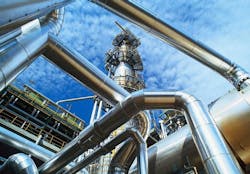Aker Carbon Capture Conducting Study to Capture 400,000 Tons of CO2 Per Year in Germany
TES has awarded a feasibility study to Aker Carbon Capture to plan and implement a carbon capture plant with a planned capacity of 400,000 tons of CO2 per year at a waste-to-energy facility in Germany.
The captured CO2 will be transported by railcar to the TES facilities at Wilhelmshaven in Northern Germany to produce e-NG, a sustainable alternative to fossil natural gas. The study will assess the optimal CO2 capture, conditioning, liquefaction, and temporary storage facility.
e-NG will be created by combining green hydrogen from renewable power with recycled CO2 from industrial emissions and biogenic CO2 to create synthetic methane or green gas. The conversion will take place in a region with abundant green electricity, making it cost-effective.
While e-NG is easy to transport and store, making it a viable and scalable clean energy source, it is chemically identical to natural gas and blends very well into the existing fuel mix. This makes it a very simple and cost-effective solution for green transition.
TES plans to produce about 15 TWh of e-NG annually, which is equivalent to 0.4 megatons of green hydrogen, by 2030.
“By using recycled CO2 to deliver green energy to users, further CO2 emissions are being avoided, contributing to Germany's goal to achieve Net-Zero greenhouse gas emissions by 2045,” said Jon Christopher Knudsen, Chief Commercial Officer at Aker Carbon Capture.
Currently, Aker Carbon Capture is delivering a Just Catch unit with a capacity of 100,000 tons of CO2 per year at Twence's waste-to-energy facility in the Netherlands. The company has also started the delivery of five Just Catch units to Orsted's bioenergy facilities in Denmark, with a design capture capacity of 500,000 tons of CO2 per year.
"We look forward to the collaboration with Aker Carbon Capture on our route towards net zero,” said Jens Schmidt, Chief Technology Officer at TES. “This evaluation of an industrial scale project will allow us to select the best of different available capture technologies based on real-life performance going forward in massive scale-up.”
Germany aims to reduce its CO2 emissions by 65% by 2030 and become carbon neutral by 2045. The German government is expected to publish its Carbon Management Strategy by the end of 2023.
About the Author
EnergyTech Staff
Rod Walton is head of content for EnergyTech.com. He has spent 17 years covering the energy industry as a newspaper and trade journalist.
Walton formerly was energy writer and business editor at the Tulsa World. Later, he spent six years covering the electricity power sector for Pennwell and Clarion Events. He joined Endeavor and EnergyTech in November 2021.
He can be reached at [email protected].
EnergyTech is focused on the mission critical and large-scale energy users and their sustainability and resiliency goals. These include the commercial and industrial sectors, as well as the military, universities, data centers and microgrids.
Many large-scale energy users such as Fortune 500 companies, and mission-critical users such as military bases, universities, healthcare facilities, public safety and data centers, shifting their energy priorities to reach net-zero carbon goals within the coming decades. These include plans for renewable energy power purchase agreements, but also on-site resiliency projects such as microgrids, combined heat and power, rooftop solar, energy storage, digitalization and building efficiency upgrades.
